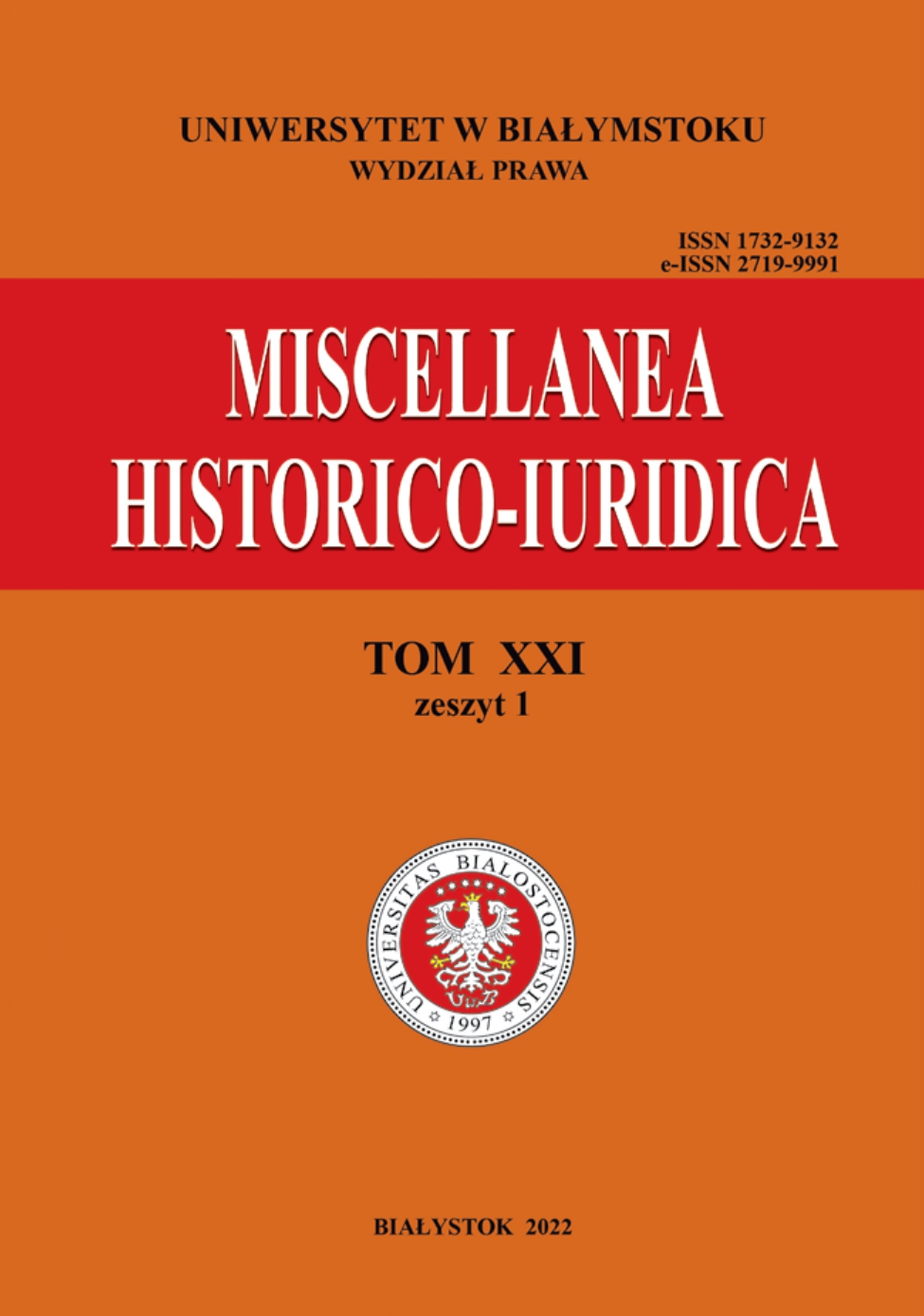Unknown Documents Concerning the Regional Council of the Poznań and Kalisz Voivodships from 1701 and 1735 in the London Archival Collection. Source Edition
Keywords:
Greater Poland, Poznań and Kalisz voivodeships, parliamentary instruction, regional councilAbstract
Recently, we can observe an increased interest in research on the history of the former Polish-Lithuanian Commonwealth based on the analysis of Western European archival resources. They present the image of Poland and Lithuania from a different point of view, which provides an interesting cognitive perspective and an opportunity to distance oneself from one’s own historiographical opinions. This is because facts that are commonly known but seen from a different, external perspective often acquire a new and valuable overtone. During the research in the National Archives and the British Library, we can find a large number of sources concerning the history of the former Polish-Lithuanian Commonwealth, which results from the active functioning of the Polish-Lithuanian state in the political struggles in Central and Eastern Europe, which was taken into account in diplomatic games in the west of the Old Continent. At the forefront of such documents are diplomatic correspondence, political writings, diaries of the Parliament, complete or partial. This group also includes instructions and accounts of local councils. Sometimes in the course of scientific research it is possible to come across manuscript documents completely unknown to Polish historiography, which either supplement the already known facts or present them in a slightly different way. This type of material is the instruction of the local council of the Poznań Voivodship “Points de l’instruction que la Province de la Grande Pologne a donnee a ses Deputes, ou Nonces pour la Diete prochain” from 1701 and “Relation de ce qui s’est passe a la Dietine de la Grande Pologne a Szroda par rapport aux Dissidents” from 1735. The first manuscript concerns the local council of the Poznań and Kalisz voivodships, which was break off, but the draft instruction was made public. On the other hand, the instruction found in London is slightly different from that known from domestic research, but the reasons for this cannot be resolved at present. As far as the latter document is concerned, i.e. the account of the 1735 local council, although the instruction itself is known, we do not know much about the course of the congress, especially about the relations between dissidents and Catholics during the local council. The found manuscript explains this in some way.
References
The British Library, Add MS 28944.
The National Archives (Kew) London, State Paper 88/116, k. 235.
Akta sejmikowe województw poznańskiego i kaliskiego. Lata 1696–1732, wyd. M. Zwierzykowski, Poznań 2008.
Akta sejmikowe województw poznańskiego i kaliskiego. Lata 1733–1763, wyd. M. Zwierzykowski, Poznań 2015.
Akta sejmikowe województw poznańskiego i kaliskiego. Lata 1668–1675, wyd. M. Zwierzykowski, R. Kołodziej i A Kamieński, Poznań 2018.
Akta sejmikowe województw poznańskiego i kaliskiego. Lata 1676–1695, wyd. M. Zwierzykowski, R. Kołodziej i A Kamieński, Poznań 2018.
Anusik Z., Karol XII, Wrocław 2006.
Dygdała J., Kwestia dysydencka w Rzeczypospolitej doby bezkrólewia 1733 roku, „Zapiski Historyczne” 1997, nr , z. 4.
Dygdała J., Saskie próby infiltracji środowiska szlacheckiego podczas bezkrólewia 1733 roku, „Kwartalnik Historyczny” 2003, R. 110, z. 4.
Glabisz G., Pacyfikacja województw poznańskiego i kaliskiego w latach 1734–1735, „Wieki Stare i Nowe” 2016, t. 11 (16).
Glabisz G., Sejmik wielkopolski w latach 1764–1793, Poznań 2022.
Glabisz G., Województwa poznańskie i kaliskie w bezkrólewiu 1733 roku, [w:] W podroży przez wiek osiemnasty... Studia i szkice z epoki nowożytnej, red. A. Perłakowski, M. Wyszomirska, M. Zwierzykowski, Kraków 2013.
Kamieński A., Dzieje czterech pokoleń ewangelickiej rodziny Unrugów w Wielkopolsce (1597–1736). Między obroną interesow protestantyzmu a lojalnością wobec Rzeczypospolitej, „Czasy Nowożytne” 2018, t. 31.
Kamieński A., Uznanie królewskiego statusu Prus przez uczestników pierwszej fazy wojny północnej (1700–1703), „Czasy Nowożytne” 2011, nr 24.
Kriegseisen W., Ewangelicy polscy i litewscy w epoce saskiej, Warszawa 1996.
Łopatecki K., Edycje źródłowe akt sejmikowych: przeszłość – teraźniejszość – przyszłość, „Miscellanea Historico-Iuridica” 2015, t. 14, z. 2.
Staszewski J., August II Mocny, Wrocław 1998.
Urzędnicy centralni i nadworni Polski XIV–XVIII wieku. Spisy, red. A. Gąsiorowski, Kórnik 1992.
Wićko D., Początek szwedzkiej interwencji w Wielkim Księstwie Litewskim w końcu 1701 roku, „Rocznik Lituanistyczny” 2019, t. 5.
Zwierzykowski M., Kwestie religijne w polityce sejmiku województw poznańskiego i kaliskiego w latach 1696–1732, w: Religia i polityka. Kwestie wyznaniowe i konflikty polityczne w Europie w XVIII wieku, red. L. Harc, G. Wąs, Wrocław 2009.
Zwierzykowski M., Samorząd sejmikowy województw poznańskiego i kaliskiego 1696–1732, Poznań 2010.
Teki Dworzaczka, http://teki.bkpan.poznan.pl/index_monografie.html.
Downloads
Published
Issue
Section
License
Copyright (c) 2022 Uniwersytet w Białymstoku (entire issue as a whole); Mariusz Sawicki (article)

This work is licensed under a Creative Commons Attribution-ShareAlike 4.0 International License.







